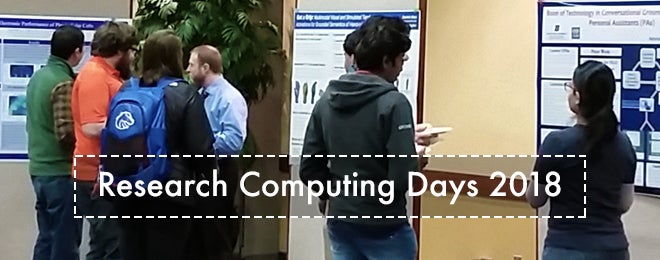
If “Research Computing Days” is the answer, the question would have to be:
What annual campus event brings together instructors and students, undergraduate and graduate, from disciplines as diverse as Computer Science, Engineering, Mathematics, Geosciences, Biomolecular Sciences, Human-Environment Systems, Educational Technology, School of Public Service, Kinesiology, and English?
Research Computing Days (RC Days), presented March 15 and 16, 2018, is an annual two-day event sponsored by the Office of Information Technology (OIT) and Division of Research and Economic Development. This year’s event brought together 103 people from across the university, uniting students and faculty around scientific computing.
“Research computing days really highlighted the impact that computing is having across the entire campus, both in areas of research and in student education. The diversity of presentations, from English to Physics, really demonstrates the importance of compute to our current students and researchers”, says Steve Cutchin, Director, OIT Research Computing.
“It’s a celebration of computing and research on campus,” says Mendi Edgar from the OIT Research Computing department, who coordinates RC Days. Students and researchers get to present research based on their own scientific computing during the poster sessions and lightning talks on topics ranging from application performance and representational modeling to overviews of high performance computing (HPC) systems utilized at Idaho National Laboratory.
Faculty and student volunteers presented hands-on Software Carpentry coding workshops in command interpreters, Git, R, Intro to Python, Python for Machine Learning, Python for Biology and MatLab.
RC Days kicked off with introductory remarks by Boise State’s Steve Cutchin, Ph.D., Director Research Computing, Harold Blackman, Ph.D., Associate Vice President, Office of Research and Economic Development, and Eric Jankowski, Ph.D., Assistant Professor of Materials Science and Engineering and chair of the Inclusive Computing Initiative. These speakers detailed the increasing importance of computing literacy for all majors, helping to explain the growth in popularity of computing across campus. The combined efforts of their offices are focused on enabling high performance computing, automation, and reproducible workflows for all researchers, they explained, with Research Computing supporting hardware, the Office of Research and Economic Development helping with funding and infrastructure, and the Inclusive Computing Initiative with training and community.
Joshua A. Anderson, Ph.D., Chemical Engineering, University of Michigan, presented the keynote address this year on the benefits of open source software for research computing in massively parallel systems–a software he developed.
One of the more exciting aspects of RC Days this year was that the Graduate College provided special funding to certify 10 volunteer faculty, students, and staff in the Software Carpentry curriculum, enabling RC Days to add 40 seats and present twice as many workshops as last year.
RC Days concluded with a hands-on lab for researchers on how to use and take advantage of the Boise State R2 High Performance Computing Cluster. This same workshop was presented last year and increased usage of the R2 cluster by almost 15 percent.
Thank you to all of our sponsors, presenters, funding partners, and the many volunteer instructor and student workshop facilitators. Please contact Mendi Edgar in OIT Research Computing at mendiedgar@boisestate.edu with questions about Researching Computing Days.